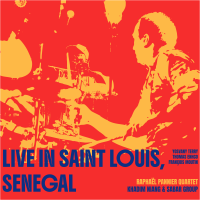Home » History of Jazz Timeline: 1934
History of Jazz Timeline: 1934
Armstrong is in Europe. He begins and ends recording with French Polydor. Recordings can be found on Classics CD Louis Armstrong and His Orchestra 1934-1936.
Armstrong's lip splits on a London stage. He retires in Paris for eight months.
While in Europe, Armstrong fires his current manager Johnny Collins. Collins retaliates by taking Armstrong's passport back to America leaving Louis "high and dry" in Europe without a passport.
Trumpeter Rex Stewart joins the Duke Ellington band.
Large bands with five brass instruments (mostly trumpets and trombones), four reed instruments (mostly clarinets and saxophones which are increasing in popularity) and four rhythm instruments (usually piano, guitar, bass and drums) become the standard. The brass and reed sections normally play together as two voices which playoff against each other in "call and response" form. Riffing (developed by Don Redman with Fletcher Henderson's band) becomes increasingly popular.
Benny Goodman has his own orchestra which supplies the Jazz portion of a popular radio show Let's Dance sponsored by Nabisco to advertise the Ritz Cracker.
Benny Goodman acquires around 36 Fletcher Henderson arrangements dating back to the 1931 Connie's Inn appearances.
Coleman Hawkins (now one of the premier Jazz players) leaves Fletcher Henderson and goes to Europe to work with Jack Hylton. He is replaced by Lester Young. The band members do not like Lester's light style. They prefer the bigger sound of Coleman Hawkins or even Ben Webster. Lester soon leaves Henderson for Andy Kirk's Clouds of Joy.
Fletcher Henderson's band breaks up. Ben Webster goes to the Duke Ellington band.
Fats Waller, currently the most popular pianist in the country, forms his own group.
Tommy and Jimmy Dorsey change the Dorsey Brothers Band from a records-only band to a full-time unit.
Quintet of the Hot Club of Paris is formed with Django Reinhardt on guitar, Stephane Grapelli on violin, Louis Vola on bass, Joseph Reinhardt (Django's brother) on guitar and Eugene Vees on guitar. This is the first non-American group to give the Americans serious competition. Their first recording is Dinah/Tiger Rag.
Sixteen year old Ella Fitzgerald wins first prize at a talent contest at the Harlem Opera House.
Sister Rosetta Tharpe (then Nubin) marries a Pittsburgh pastor named Thorpe. She will divorce shortly and change her name to Tharpe.
Soul Jazz saxophonist Stanley Turrentine is born in Pittsburgh, Pa.
Keyword Search
Disclaimer: Though we have checked our facts, this timeline may contain erroneous information. If you discover errors or omissions, please bring them to our attention.









